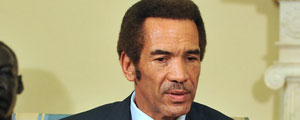
The venomous attack on Botswana President Ian Khama in official circles in Zimbabwe demonstrates exactly what is wrong with continental groupings such as the African Union (AU) and its regional offspring the Southern African Development Community (Sadc).
NewsDay Editorial
The groupings are hamstrung by a phenomenon called groupthink, a culture which ensures that the continent remains stuck in its infamous past as far as governance, electoral democracy and human rights are concerned.
Groupthink is defined as “a psychological phenomenon that occurs within a group of people, in which the desire for harmony or conformity in the group results in an incorrect or deviant decision-making outcome. Group members try to minimise conflict and reach a consensus decision without critical evaluation of alternative ideas or viewpoints, and by isolating themselves from outside influences.”
Khama pointed out two good examples of groupthink which could have a negative bearing on the future of the continent. For that he received the ire of the Zimbabwean government through The Sunday Mail.
Khama, in an interview on Botswana Television, said that his country would no longer be part of future Sadc election observer missions and that sitting heads of state should, contrary to an AU decree, be indicted at the International Criminal Court if they have committed crimes that deserve to be tried at The Hague.
He criticised both the AU and Sadc for not pointing out irregularities in the July 31 harmonised elections in Zimbabwe which he said the groupings endorsed even though they were not fair.
Indeed, in its report Sadc said the elections were free and peaceful, but did not describe them as fair.
- Chamisa under fire over US$120K donation
- Mavhunga puts DeMbare into Chibuku quarterfinals
- Pension funds bet on Cabora Bassa oilfields
- Councils defy govt fire tender directive
Keep Reading
Khama rightly pointed this fact out and also reminded all who cared to listen that Sadc has crafted electoral guidelines which, if not followed consistently, will impact negatively on future elections in the region and on the continent as a whole.
Khama was forthright in his criticism, but for this he has to be whipped into line by inane statements such as: “Surely the rest of Sadc and the rest of Africa can’t be wrong and only little Khama is right?”
Surely, both the AU and Sadc have been wrong in the past and examples abound.
A continent that says all leaders should think alike and not raise contrary, if often controversial, opinions deprives itself of individual creativity, uniqueness and independent thinking.
The continent becomes dysfunctional and continues to live in a fool’s paradise characterised by a false sense of invincibility that will eventually collapse like a deck of cards.
Khama should be applauded for bringing forward a new kind of leadership to Africa; a leadership that is forward-looking and ready to challenge the kind of consensus thinking that has left Africa stuck in an aboriginal mindset.











